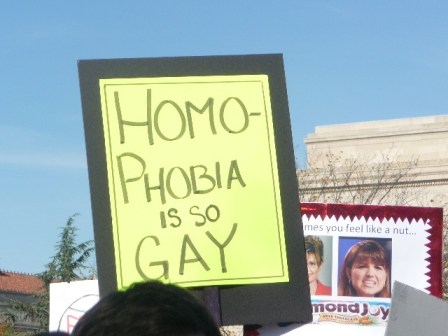It’s no great leap of faith to anyone who’s paying attention that when someone vocally opposes anything and everything to do with homosexuality even though it clearly doesn’t affect their life in any way, it might be because they’re struggling with the fact that they themselves are gay. After all, we’ve seen in plenty of times — from Ted Haggard to George Rekers to Mark Foley and beyond, it seems clear that “the more anti-gay the leader, the more likely the leader is secretly gay.” It’s understandable, in a way — if you’ve been raised to believe that being gay is wrong, but begin to recognize same-sex attraction in yourself, it may seem like your only way out is to decide that homosexuality is a choice, and that other people are evil for making it. 
Now, for the first time, there may be some hard science around this phenomenon. New psychology studies demonstrate that “homophobia is more pronounced in individuals with an unacknowledged attraction to the same sex and who grew up with authoritarian parents who forbade such desires.” Specifically, scientists say that, as Jezebel puts it, “controlling parents tend to raise children that grow up to have difficulty loving themselves. And adults that don’t really like themselves tend to dislike all sorts of things about themselves — including homosexuality.”
Four studies were conducted with college-age participants in the US and Germany, in which self-identification of sexual orientation, sexual attraction, and patterns of upbringing were explored:
First, scientists asked participants to perform a timed reaction test. Subjects were to click buttons indicating “me” or “others” when certain word pairings flashed across the screen, like “Self,” “Me,” “Gay,” and “Straight.” Participants who lagged in reaction to the “me/gay” pairing were presumed to harbor a secret subliminal gayness. Next, subjects were asked to browse through same and opposite-sex pictures, a judgement of how attracted to the same or opposite sex the subjects were. Third, subjects were asked questions about their upbringing, whether or not their parents allowed them to be freely themselves or tried to mold them into what the parents wanted them to be. Questions of the parents’ homophobia were also asked during this segment. Finally, researchers attempted to glean subjects’ overt and implicit homophobia by asking them to fill out questionnaires about their beliefs and then complete another subliminal message-type exercise.
Some of the studies’ methodology may seem confusing or questionable — it’s difficult to measure discrepancies in things like self-reported vs. “real” sexual orientation. But one of the co-authors maintains that it’s enough to function as “empirical evidence to support the psychoanalytic theory that the fear, anxiety, and aversion that some seemingly heterosexual people hold toward gays and lesbians can grow out of their own repressed same-sex desires.” And in finding out how homophobia works, it can also lead to a greater understanding of its effects — like the researcher’s note that “attackers often perceive some level of threat from homosexuals,” and understanding as clearly as possible the psychological basis behind that kind of “gay panic” can help us see hate crimes for what they really are, and maybe prevent them.
Perhaps even more so than the fact that this study seems to confirm what many of us know anecdotally to be true, it drives home exactly how painful and dangerous homophobic home environments can be. One researcher observed that “in controlling and homophobic homes, embracing a minority sexual orientation can be terrifying… These individuals risk losing the love and approval of their parents if they admit to same sex attractions, so many people deny or repress that part of themselves.” Pointing and laughing — or, if we’re feeling charitable, shaking our heads sadly — at people like Ted Haggard is one thing, but we have to remember that we’re only looking at the effect, not the cause. That we don’t get to see the home that person grew up in that forged them into the self-loathing thing we see now; and we also aren’t seeing the homes that still exist just like it today, and all the people who are growing up with the belief that the only way they can be deserving of love is to deny a fundamental part of who they are.
If we’re going to combat homophobia and the violence, hatred and bullying that it engenders, we have to address where it comes from. Certainly one place it comes from is a pervasive overarching culture of heteronormativity and strict gender policing, but it also comes out of smaller, more private situations. Like individual homes in which a child is taught that deviation of any kind of expected norms and values means that they’re an unworthy person who deserves to be harshly punished. Because when those two things are combined, we have a generation of people who believe that their own goodness as a person is dependent upon their ability to repress their sexual orientation and their hatred of people who are openly gay, and who believe that harsh punishment is the strategy with which to enact change in the world. And we don’t need a study to tell us that’s a bad idea.








Comments
homophobia is also highly linked to photos of dancing hotdogs appearing on comments on certain LGBT websites
FUN FACT: Dancing hot dogs are now my preferred form of trigger warning.
That “sometimes you feel like a nut…” picket sign is pretty funny, but it also really makes me want an Almond Joy.
I experienced this first-hand.
Not buying it. The Ted Haggards and George Rekerses of the world wouldn’t be where they are if it wasn’t for vast networks promoting their work, from political campaigns to multi-national corporations. Without the psychology community standing behind his research, Rekers would be nothing. And without the Republican party to legitimize the Christian anti-gay movement, none of its policy proposals would be law. Haggard would be as popular as Fred Phelps.
My point is, they can’t all be secretly gay. In fact, I’m not even sure they’re all homophobic. NOM practically admitted that they thought the marriage debate was stupid. For them it’s boiled down to politics. Keep the cause going to get enough donations to keep the cause going.
It’s easy to think of bigotry as this passionate hatred. Oh, it’s there. And maybe it’s cause by repressed urges. But so much of the damage gets done by people who, I really hate to say it, don’t care. Gay is just another issue to fight. I don’t know if that makes the work they’ve done more or less excusable. But it is important to address the cause of homophobia. And a lot of that doesn’t come from this place.
It isn’t just politicians though. When I was in high school, there was this super annoying middle schooler who just wouldn’t stop talking about how this that and the other was so ef-ing gay and so and so was such a stupid fag every. single. day. Guess who started coming to GSA meetings a couple of years later.
I don’t live in the best place,but it’s better then there..
For a brief second, I thought the title read “Virginia Linked to Latent Homosexuality.” And I was fully prepared to believe it, too.
Yeah, I’ve drunk the Autostraddle Kool-Aid too.
I thought it said that, too! Autostraddle my MIIIIND.
This isn’t new. There was a study done a while ago where they showed homophobic/non-homophobic men gay porn and measured arousal levels, which were…higher in the homophobes! SURPRISE!
http://www.psychologytoday.com/blog/the-big-questions/201106/homophobic-men-most-aroused-gay-male-porn
That’s somewhat contested because apparently “tumescence” is also caused by discomfort.
But wouldn’t the straight people that were tested be uncomfortable watching gay porn too? The link that orestes posted said that the device only tested for sexual arousal, not fear or nervousness.
May we live in a world where closeted gays become MOST tolerant and accepting for fear of being outed. Then maybe bullying will end and then homophobia and then maybe we can all just be gay if we are gay.
Why did they presume that pausing over the words ‘me/gay’ meant the subjects were gay? I would probably pause over ‘me/girly’ or ‘self/Nazi’ or ‘I/stupid’, but it wouldn’t be because I’m a stupid girly Nazi.
Or am I just in denial…?
Does the word “homophobia” bug anyone else? It’s not a “phobia.” That is not the correct term. Makes my eye twitch every time. THIS IS WHY WE CAN’T HAVE NICE PSYCHOLOGY.
Wikipedia suggests “heterosexism” or “homonegativity” as alternatives.
/semantics, dammit
(Personally, I just say “discrimination” or “prejudice,” because that’s all it is. It’s not some disease or anything.)
Absolutely! For the queer theory nerds out there, Gregory Herek wrote an excellent (and short) article on that topic, “Beyond “Homophobia”: Thinking About Sexual Prejudice and Stigma in the Twenty-First Century”
Downloadable here:
http://cregs.sfsu.edu/article/beyond_homophobia_thinking_about_sexual_prejudice_and_stigma_twenty_first_century